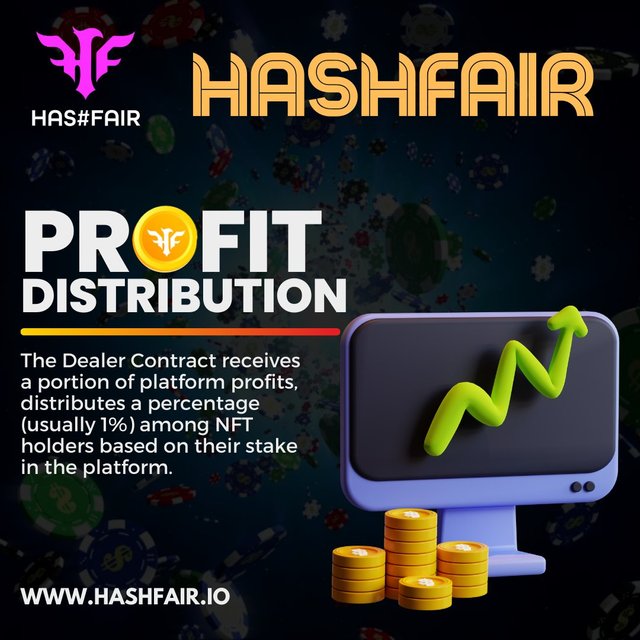HashFair's | Revolutionary platform, where each roll, spin, or deal is reliably calculated using hash values, defining the future of secure and trustworthy online gaming.
Introduction
Traditional online games platforms often rely on a centralized authority or a 'trusted third party' to maintain fair play, which can create a layer of opacity and mistrust. HashFair, however, disrupts this approach by providing an autonomous dealer that guarantees both the integrity of game outcomes and the immediacy of transactions. By leveraging blockchain technology, all game outcomes are transparent, traceable, and tamper-proof, which not only instills trust among gamers but also removes the need for a central authority.
What is Hashfair?
HashFair is an innovative online games platform pioneering the integration of Web 3.0 technologies within the gaming industry. Built upon the robust infrastructure of blockchain technology, decentralized finance (DeFi), and smart contracts, HashFair has introduced the world’s first decentralized dealer. Operating autonomously on an immutable smart contract, this decentralized dealer is a groundbreaking feature that has the potential to revolutionize the online gaming landscape.
HashFair is becoming increasingly popular for several reasons:
- Transparency: The openness of blockchain technology ensures that all transactions and game results are transparent and can be audited by anyone. At HashFair, the result is determined by the transaction hash on the blockchain, making it impossible to manipulate the result. This transparency builds trust among players, as they can verify the fairness of the game themselves.
- Ownership and Control: HashFair revolutionized online gaming by integrating a Web 3.0 wallet. Unlike traditional platforms, players play directly from their wallets, transferring funds to the game's smart contracts. The contract independently manages the distribution of funds based on game results, eliminating human interference and ensuring quick access to winnings. It creates a safe, transparent and decentralized gaming experience, heralding a new era in the industry.
- Interoperability: Digital assets in Web 3 games can often be used across multiple games or platforms. This interoperability appeals to gamers as it extends the value and usability of their digital assets.
- Decentralization: Traditional games are usually controlled by a central authority or company. If the company goes out of business or decides to close the game, players can lose everything. However, in decentralized Web 3 gaming, the game and its assets remain on the blockchain regardless of what happens to the original developer or platform.
- Earning Potential: Web 3.0 games often incorporate a play-to-earn model, where players can earn tokens or other prizes that have real-world value. This dynamic offers a whole new way to engage with games, where players can not only have fun but also potentially earn money.
Security: Blockchain technology offers enhanced security measures. The decentralized nature of technology means that it is very difficult for hackers to compromise systems. - Security: Blockchain technology offers enhanced security measures. The decentralized nature of technology means that it is very difficult for hackers to compromise systems.
Community Driven: Web 3 games like HashFair often prioritize community involvement and decision making. Players have a voice and can influence the future direction of play through democratic governance processes. This creates a more inclusive environment, fostering a sense of camaraderie and connection among players. - Profit Sharing in the Community: Another important aspect of Web 3 gaming is the profit sharing model. Instead of profits accruing solely to game or platform developers, they are distributed among a community of players. This aligns the incentives of the players with the incentives of the game itself, as the success of the game directly impacts the profitability of the players. This not only rewards players for their involvement, but fosters a shared sense of purpose and collaboration.
- Immutability: Finally, the immutability of blockchain technology is another major attraction for players. Once data is written on the blockchain, it cannot be changed or tampered with. This immutability protects the integrity of games, player transactions, and digital assets, providing an additional layer of security and trust.
Web 3 games like HashFair are reshaping gaming by leveraging transparency, ownership, interoperability, decentralization, and profitability. They foster user engagement through community interaction, profit-sharing, and immutable systems. With NFT integration and granting supervisory powers, HashFair is evolving gamers from mere players to influential stakeholders, making them integral to the game’s progress and success. Essentially, this represents a future where gamers are at the core, directly influencing and benefiting from the gaming ecosystem.
The Dealer Contract
The HashFair Dealer Contract is primarily responsible for managing the supply of HFG Tokens and distributing profits among NFT holders. However, it does not directly handle gaming round transactions. The gaming round transactions are typically handled by other contracts or components of the HashFair platform.
In the context of a gaming round, the Dealer Contract may be involved in the following ways:
- Token Transfer: When a player participates in a gaming round, they may need to transfer HFG Tokens to a specific contract or address to place their bets. The Dealer Contract can facilitate this token transfer by allowing players to interact with it and transfer their HFG Tokens to the appropriate gaming contract.
- Profit Distribution: After a gaming round is completed and profits are generated by the platform, the Dealer Contract receives a portion of these profits from the platform’s profit calculation mechanism. The Dealer Contract then distributes a percentage of this profit (usually 1%) among the NFT holders according to their stake in the platform.
- Updating Token Balances: As profits are distributed to NFT holders, the Dealer Contract updates the token balances of each holder based on their share of the profit. This ensures that the NFT holders' HFG Token balances accurately reflect their earnings.
It’s important to note that the specific implementation and details of gaming round transactions may vary depending on the architecture and design of the HashFair platform. The Dealer Contract’s role in gaming round transactions would be defined by the platform’s smart contract infrastructure and how it interacts with other components involved in gaming round operations.
Token Details
- Name: HashFair
- Symbol: HFG
- Total Supply: 2,000,000,000 HFG
- Contract Address: https://polygonscan.com/token/0x681E04eA8F903da45A6520eE1e5F4B21b4503fcf
- Blockchain: Polygon Mainnet
#HashFairGames #HashFair #HFG #blockchain #cryptocurrency #technology #bitcoin #money #crypto #Binance #BNB #cryptocurrencies #fintech @Hashfair_Games
Official Link:
WEBSITE: https://hashfair.io
FACEBOOK: https://www.facebook.com/hashfairgames
TWITTER: https://twitter.com/hashfair_games
TELEGRAM: https://t.me/HashFairgames
MEDIUM: https://medium.com/@hashfairgames
YOUTUBE: https://www.youtube.com/@hashfairgames
REDDIT: https://www.reddit.com/r/Hashfair/
GITHUB: https://github.com/thehashfairgames
Author
Forum Username: Derryl12
Forum Profile Link: https://bitcointalk.org/index.php?action=profile;u=2629388
Telegram Username: @derryl12
Polygon Chain Wallet Address:
0xe0f539b36B0eE5F76A3a553A71fa22530f18C532
Post Link: https://bitcointalk.org/index.php?topic=5457431.msg62608276#msg62608276

.jpeg)
